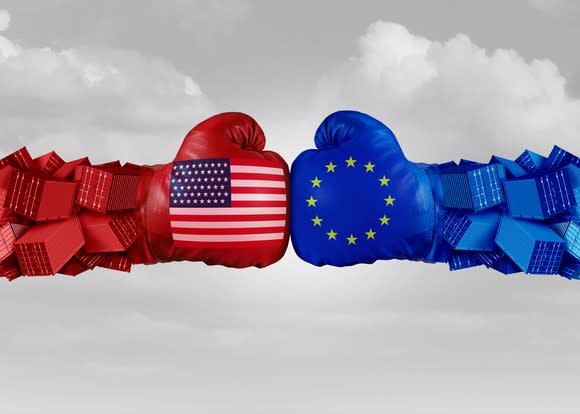Should Harley-Davidson Be Worried About Trump's Threats?
It's bad enough that Harley-Davidson (NYSE: HOG) is being targeted for retribution by the European Union because of the tariffs imposed on imported steel and aluminum by President Trump, but its decision to move some production overseas to get around the steep duties has angered the president, who has promised to punish the bike maker for its actions.
The question is, should investors worry that Trump will actually turn his rhetoric into policy? Probably not.

Image source: Getty Images.
A bully pulpit
Harley-Davidson made a smart business decision to export production of motorcycles destined for the European market to one or more of its production facilities in Brazil, India, or Australia to evade the tariffs. It also previously announced the opening of a new assembly plant in Thailand to skirt Asian tariffs and reduce transportation costs.
It is facing plummeting sales in the U.S., and increasing foreign motorcycle sales are one of the linchpins of the motorcycle giant's turnaround plan. Preventing its bikes from being slapped with higher ticket prices means that strategy is still viable.
Unfortunately, Trump seemed to take the announcement as a personal affront. White House trade advisor Peter Navarro said Trump "felt betrayed" because the tax reform measure he signed helped companies like Harley-Davidson.
Trump let loose a barrage of tweets that said, "A Harley-Davidson should never be built in another country-never!" and vowed, "they will be taxed like never before!" He also noted his administration was working with foreign motorcycle manufacturers to lure new competitors to the U.S. to take on Harley.
The bike maker hasn't responded to the president chiding it, but it appears Trump is mistaken about what Harley-Davidson is intending, because he continued on Twitter, "Companies are now coming back to America. Harley must know that they won't be able to sell back into U.S. without paying a big tax!"
High cost of protectionism
The production of motorcycles Harley is moving overseas is not intended for the U.S. market. The motorcycles it is selling here will still be built here, but Trump may have agreed with the bike maker's unions, who alleged that the new assembly plant in Thailand was shipping American jobs overseas.
Harley has disputed that as well, and noted that U.S. jobs are actually being preserved because the components that go into building the motorcycle are still being made here; the bikes are just being assembled overseas.
By assembling motorcycles in Thailand, it avoids having to pay the 60% tariff the country imposes on U.S. imports. China imposes a 30% tariff; Malaysia, 23%; and Taiwan, 20%. By assembling the bikes in Asia, the company avoids those costs and, equally important, lowers both the cost and time involved in shipping them from the U.S. Harley noted that shipping times to China, for example, will decrease from 45 to 60 days down to just five to seven days.
The motorcycle company says that by assembling its bikes for the European market overseas, it will be able to avoid the $2,200 price increase its motorcycles would face from the new tariffs.
Recently, rival Polaris Industries (NYSE: PII) said it was also considering moving some production of its Indian Motorcycle brand out of the U.S. to avoid the tariffs.
Making a bad situation worse
By escalating the rhetoric against Harley-Davidson, Trump risks actually worsening the bike maker's situation as some bike buyers may forego purchasing a Harley-Davidson in favor of another manufacturer. Harley's U.S. sales in the first quarter plunged 12% from the year-ago period, accelerating a decline that has been going on for four years.
Also, if Trump successfully lures other motorcycle manufacturers to compete against Harley, that could make its competitive position even worse, as it's been losing market share for some time now, but that likely won't come to fruition.
Foreign manufacturers aren't exactly enthusiastic about the escalating trade war. BMW, which makes both cars and motorcycles, is against them, and Hyundai has said tariffs on autos would be devastating. It's easy to imagine other foreign motorcycle makers feeling the same way, and if Trump ended up helping Japanese bike makers like Honda, Kawasaki, and Suzuki compete against Harley, it wouldn't look good.
Ultimately, it seems the effects of the tirade against Harley-Davidson will be negligible. First, Harleys for the U.S. market are still being made here, so they won't face any higher taxes, as Trump suggested, and competitors aren't exactly enamored with the trade war, either. While a few bike buyers might be persuaded to not buy a Harley because of the mistaken belief that U.S. jobs were being shipped overseas, Harley-Davidson is still the quintessential American bike company, and for those who consider that a key selling point, it hasn't changed.
More From The Motley Fool
Rich Duprey has no position in any of the stocks mentioned. The Motley Fool has no position in any of the stocks mentioned. The Motley Fool has a disclosure policy.

 Yahoo Finance
Yahoo Finance 